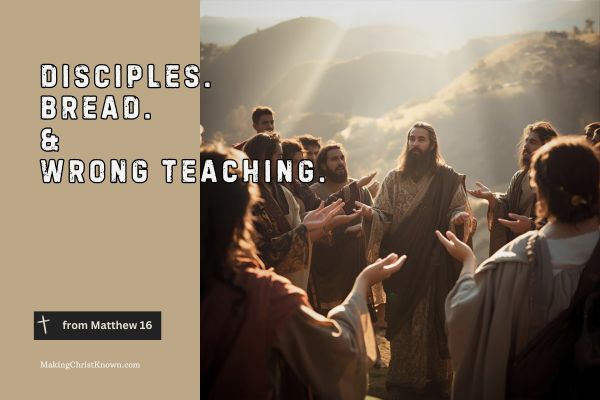Beware the Leaven: Jesus Warns of Wrong Teaching (Matthew 16:5–12)
A tiny bit of yeast changes a whole loaf. In the same way, a small wrong idea can shape many lives. This short Matthew Bible lesson tells why Jesus warns of wrong teaching — and what that means for us today.
What Jesus Said — and Why It Matters
In Matthew 16:5–12, Jesus uses a short, everyday image to teach something important. The disciples were worried about bread. Jesus answered in a way that points to something deeper: bad teaching spreads like leaven. That warning still matters for churches and individual believers today.
“And the disciples came to the other side of the sea, but they had forgotten to bring any bread.”
“And Jesus said to them, ‘Watch out and beware of the leaven of the Pharisees and Sadducees.’”
“They began to discuss this among themselves, saying, ‘He said that because we did not bring any bread.’”
“…Then they understood that He did not say to beware of the leaven of bread, but of the teaching of the Pharisees and Sadducees.” — Matthew 16:5–12 (NASB)
“Leaven” Means Influence — A Small Amount is Powerful!
In Jewish culture, leaven (yeast) was an everyday image: a small amount makes the dough rise. Jesus turned that image into a spiritual warning. A small false idea — or a compromise — can change whole communities over time.
Who Were the Pharisees and Sadducees?
These were the religious leaders of the day. The Pharisees emphasized strict law-keeping, while the Sadducees were mostly tied to the temple. They were many times skeptical about resurrection and miracles. Jesus challenged the heart behind their teachings. When He says, “beware of the leaven,” He’s warning about distortions in beliefs and practices that look small but spread wide.
What Jesus Saw in the Disciples
Jesus called them “men of little faith.” Even after seeing miracles, the disciples still sometimes missed the point. And that reminds us that knowledge of Scripture is not the same as trusting Jesus. Both matter.
How Small Errors Become Big Problems
Think about seasoning in a recipe: one pinch of salt can change the whole pot. The same goes for teaching. A small, unchecked error can influence how people think about God, grace, and daily life.
Why We Should Pray, Think, and Act
- Pray for wisdom and discernment.
- Think before sharing or repeating a teaching—check Scripture and trusted sources.
- Act lovingly but firmly when you encounter false or confusing teaching.
Examples of False Teaching Today
False teaching doesn’t always look dramatic. Sometimes it’s a small twist on truth that changes priorities or confuses the gospel.
Here are a few modern examples to watch for:
- Turning Christianity into a prosperity-only message that ignores repentance and sacrifice.
- Saying grace means never addressing sin or the need for change.
- Putting church tradition above the clear teaching of Scripture.
- Claiming secret or new revelations that contradict the Bible.
All of these start small and then shape what people expect from faith. That’s exactly the kind of “leaven” Jesus warned about.
Where to Look for Solid Teaching
To stay grounded, return to Scripture and trustworthy Bible lessons. You can find the Bible online in many version. I personally use Bible Gateway for my verse look ups and inspiration. But there are many other good resources.
Questions to Ask When You Hear a New Teaching
- Does this line up with clear Bible teachings?
- Does it point people to Jesus, or away from Him?
- Is it humble, and does it encourage repentance and growth?
Be Ready to Change — and to Help Others
Jesus’ warning calls us to careful listening and to loving correction. Small errors can spread, but careful discipleship and clear teaching can stop the leaven before it takes over. Pray for discernment, encourage truth, and point people back to Christ.
Love in Christ,
— Bob
If you found this helpful, you can explore other posts at Making Christ Known and related lessons like Parables of Jesus. If you’re reflecting on the core of the gospel, read John 3:16 for a clear reminder of God’s love and purpose.
Discover more from Making Christ Known
Subscribe to get the latest posts sent to your email.
